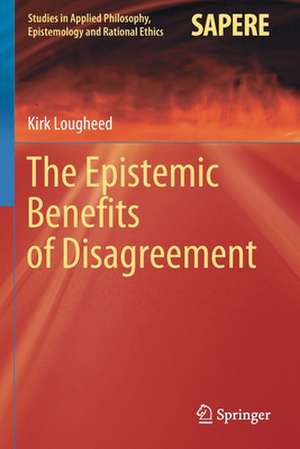The Epistemic Benefits of Disagreement: Studies in Applied Philosophy, Epistemology and Rational Ethics, cartea 51
Autor Kirk Lougheeden Limba Engleză Paperback – 21 ian 2021
| Toate formatele și edițiile | Preț | Express |
|---|---|---|
| Paperback (1) | 379.30 lei 6-8 săpt. | |
| Springer International Publishing – 21 ian 2021 | 379.30 lei 6-8 săpt. | |
| Hardback (1) | 365.93 lei 39-44 zile | |
| Springer International Publishing – 21 ian 2020 | 365.93 lei 39-44 zile |
Din seria Studies in Applied Philosophy, Epistemology and Rational Ethics
- 20%
 Preț: 603.89 lei
Preț: 603.89 lei -
 Preț: 397.59 lei
Preț: 397.59 lei -
 Preț: 359.53 lei
Preț: 359.53 lei - 20%
 Preț: 989.96 lei
Preț: 989.96 lei - 24%
 Preț: 787.48 lei
Preț: 787.48 lei -
 Preț: 390.08 lei
Preț: 390.08 lei -
 Preț: 370.88 lei
Preț: 370.88 lei - 15%
 Preț: 641.20 lei
Preț: 641.20 lei - 20%
 Preț: 991.60 lei
Preț: 991.60 lei - 20%
 Preț: 646.95 lei
Preț: 646.95 lei - 15%
 Preț: 653.98 lei
Preț: 653.98 lei -
 Preț: 384.48 lei
Preț: 384.48 lei -
 Preț: 395.47 lei
Preț: 395.47 lei - 18%
 Preț: 1216.95 lei
Preț: 1216.95 lei - 18%
 Preț: 947.50 lei
Preț: 947.50 lei -
 Preț: 388.72 lei
Preț: 388.72 lei -
 Preț: 390.08 lei
Preț: 390.08 lei -
 Preț: 395.09 lei
Preț: 395.09 lei -
 Preț: 394.12 lei
Preț: 394.12 lei - 15%
 Preț: 644.82 lei
Preț: 644.82 lei - 15%
 Preț: 698.15 lei
Preț: 698.15 lei - 18%
 Preț: 1840.91 lei
Preț: 1840.91 lei - 20%
 Preț: 656.84 lei
Preț: 656.84 lei -
 Preț: 389.70 lei
Preț: 389.70 lei - 20%
 Preț: 991.46 lei
Preț: 991.46 lei - 15%
 Preț: 585.73 lei
Preț: 585.73 lei - 15%
 Preț: 711.40 lei
Preț: 711.40 lei - 15%
 Preț: 589.33 lei
Preț: 589.33 lei - 15%
 Preț: 700.42 lei
Preț: 700.42 lei
Preț: 379.30 lei
Nou
Puncte Express: 569
Preț estimativ în valută:
72.59€ • 75.69$ • 60.33£
72.59€ • 75.69$ • 60.33£
Carte tipărită la comandă
Livrare economică 20 martie-03 aprilie
Preluare comenzi: 021 569.72.76
Specificații
ISBN-13: 9783030345051
ISBN-10: 303034505X
Pagini: 126
Ilustrații: XIV, 126 p.
Dimensiuni: 155 x 235 mm
Greutate: 0.21 kg
Ediția:1st ed. 2020
Editura: Springer International Publishing
Colecția Springer
Seria Studies in Applied Philosophy, Epistemology and Rational Ethics
Locul publicării:Cham, Switzerland
ISBN-10: 303034505X
Pagini: 126
Ilustrații: XIV, 126 p.
Dimensiuni: 155 x 235 mm
Greutate: 0.21 kg
Ediția:1st ed. 2020
Editura: Springer International Publishing
Colecția Springer
Seria Studies in Applied Philosophy, Epistemology and Rational Ethics
Locul publicării:Cham, Switzerland
Cuprins
Chapter 1: Introduction to the Epistemology of Disagreement.- Chapter 2: An Analysis of Ideal Cases of Disagreement.- Chapter 3: An Analysis of Epistemic Peerhood.- Chapter 4: The Benefits to Inquiry Argument.- Chapter 5: Objections to the Benefits to Inquiry Argument.- Chapter 6: Disagreement and Change of View.
Textul de pe ultima copertă
This book presents an original discussion and analysis of epistemic peer disagreement. It reviews a wide range of cases from the literature, and extends the definition of epistemic peerhood with respect to the current one, to account for the actual variability found in real-world examples. The book offers a number of arguments supporting the variability in the nature and in the range of disagreements, and outlines the main benefits of disagreement among peers i.e. what the author calls the benefits to inquiry argument.
Caracteristici
Discusses the variability in the nature and in the range of disagreements among peers Offers a broader definition of epistemic peerhood that can accommodate cases of real-life worldview disagreement Defends the idea that there are epistemic benefits to remaining steadfast in the face of disagreement within the context of inquiry Answers a number of objections to the benefits to inquiry argument
